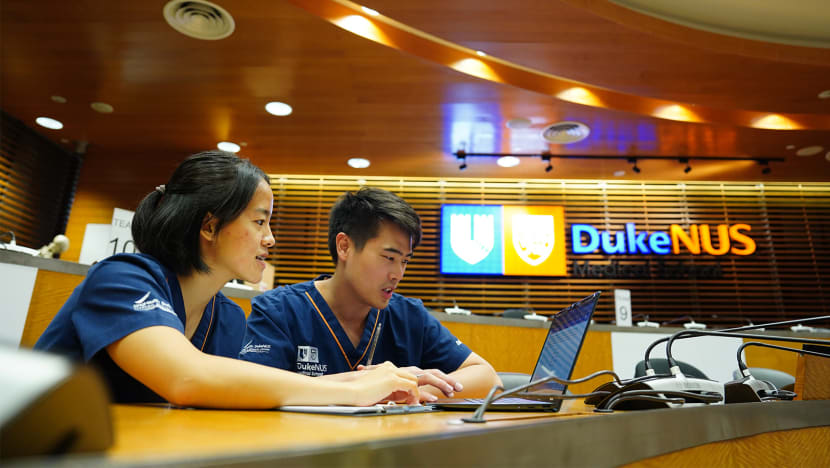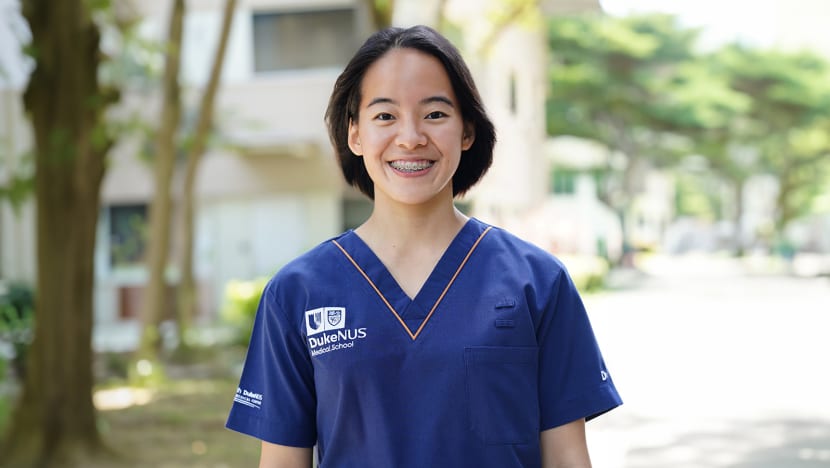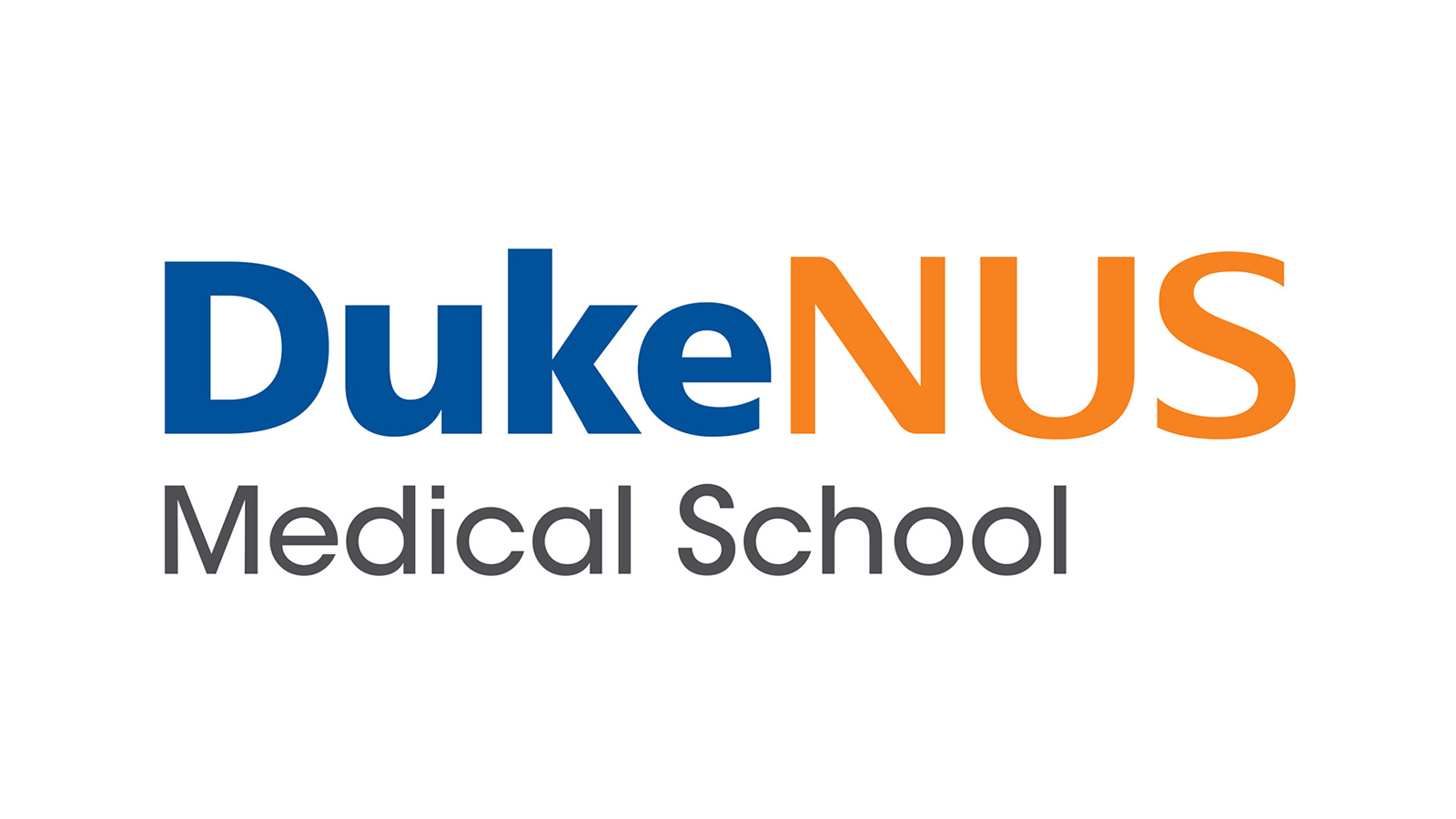Preparing future-ready clinicians: Students from diverse backgrounds gear up for tomorrow’s healthcare
Duke-NUS Medical School unites top-tier medical education, translational research and innovation from Duke University and the National University of Singapore, providing a unique route for students to pursue graduate-entry medicine.

As Singapore’s only graduate-entry medical school, Duke-NUS encourages its students to initiate and lead projects that drive positive healthcare outcomes. Photos: Duke-NUS Medical School

This audio is generated by an AI tool.
Mr Jasper Chua’s diverse array of experiences may seem unrelated at first glance – he has flown as a student pilot, explored the ocean as a scuba instructor and earned a diploma in veterinary technology. Yet each of these has contributed to his passion for medicine.
Now 30, Mr Chua is enrolled in the Doctor of Medicine (MD) programme at Duke-NUS Medical School, and is set to graduate in 2026.
Duke-NUS is Singapore’s only graduate-entry medical school, bringing together the best in medical education, translational research and innovation from two universities: Duke University in the US and the National University of Singapore (NUS). Graduates earn degrees jointly awarded by Duke and NUS.
DERIVING RESILIENCE FROM HIS ACADEMIC BACKGROUND

Mr Chua was drawn to medicine after realising that the scope of veterinary practice in Singapore was primarily focused on companion animals, which he found limiting.
Aiming to make a tangible difference to his patients’ lives, he volunteered with the Children’s Cancer Foundation in a public hospital during his undergraduate studies in life sciences.
However, in 2021, Mr Chua faced a setback when his application to join Duke-NUS’ Class of 2025 was rejected. Undaunted, he decided to reapply the following year. “My involvement in research as an undergraduate had taught me to view failure not as a barrier, but as a catalyst for development,” he said.
After months of intensive study, Mr Chua re-applied to Duke-NUS, armed with a higher Medical College Admission Test score and a refined personal statement. He was accepted into the Class of 2026.
EXPLORING CLINICAL INNOVATION IN A PROGRESSIVE LEARNING ENVIRONMENT
Students from various academic backgrounds, like Mr Chua, benefit not just from the university’s TeamLEAD (Learn, Engage, Apply, Develop) approach that emphasises critical thinking and collaborative learning, but also from curriculum-based involvement in original research projects aimed at addressing real-world healthcare challenges.
Describing the Duke-NUS experience as “progressive, empowering and centred on self-discovery”, Mr Chua finds the flipped-classroom format of many modules beneficial. It enables him to explore his learning preferences by studying materials at home before engaging in meaningful discussions and peer teaching in class. “For instance, I realised that interactive simulations and question banks helped me grasp complex concepts more effectively than traditional lectures,” he said.
Students at Duke-NUS are also encouraged to initiate and lead projects that create positive healthcare outcomes. Mr Chua highlighted Project DOVE, a student-led, school-supported initiative aimed at enhancing public health in western Nepal. The project involved a comprehensive needs assessment with house visits and a health camp. “This hands-on experience exemplifies the empowering spirit of Duke-NUS, which prepares us to be proactive and compassionate leaders in global health,” said Mr Chua.
Mr Chua is set to participate in the Duke-NUS Healthcare Innovator Programme (DHIP), an initiative launched in 2022 that brings together a multidisciplinary team of students from Duke-NUS, NUS Biomedical Engineering and NUS Business to work on pressing clinical needs under the mentorship of practising clinicians and industry experts. His DHIP team will develop innovative strategies to address surgical challenges.
Aspiring to become a surgeon, Mr Chua believes the role’s combination of technical skill, ability to address complex medical conditions and immediate impact on patient outcomes aligns with his passion for hands-on medical practice and problem-solving.
“Surgery provides a unique platform for innovation, and I am excited by the prospect of contributing to advances in surgical techniques and patient care,” he added. “My long-term goal is to blend research with clinical innovation, advancing novel methodologies to improve patient outcomes globally.”
DEFINING HER PURPOSE IN MEDICINE

When applying to university, Ms Low Xi Zhi decided not to pursue her lifelong interest in studying medicine – at least not at first. “I needed some time to grow,” she explained. “I didn’t have the emotional maturity or confidence to take on the responsibilities of being a doctor.”
She chose to enrol in the Engineering and Medicine track, a conditional admissions pathway jointly offered by Duke-NUS and the NUS Faculty of Engineering, designed to nurture clinicians capable of harnessing technological advancements for impactful healthcare innovations. After earning their Bachelor in Engineering degree at NUS, students progress to the MD programme at Duke-NUS.
Now 25, Ms Low reflected that her four years studying engineering were crucial in the development of her problem-solving skills and maturity: “Investing myself in the challenging engineering coursework gave me the confidence to think and act on my feet, and the humility to always be open to learning.”
During this time, grieving the loss of her loved ones also prompted her to reflect on her purpose in pursuing medicine.
“When I was young, I wanted to help people by solving their problems and relieving their suffering,” she said. “But being there with my loved ones at the end of their lives, I learnt that sometimes the best thing I can do is to bear witness to their life’s journey. As a doctor, I would like to be a source of strength and light for my patients, and walk with them to make their journey more comfortable and less lonely. Ultimately, it is my patient’s journey and I play the supporting role.”
Since entering Duke-NUS, her perspective has been further enriched by Professor Lalit Kumar Radha Krishna, who teaches professionalism and bioethics. Reflecting on his classes, which often involve group discussions on real-life healthcare scenarios, she said: “His classes touch on the humanistic side of medicine and remind us that we are humans first before we are doctors. These discussions, combined with our own clinical experiences, help us build an ethical framework grounded in kindness and empathy.”
Recognising the value of patient-centred care, Ms Low is combining her engineering skills with an empathy-driven resolve to address healthcare challenges. Under the guidance of her clinical mentors, she has been developing a machine learning and natural language processing tool that will enable clinicians to assess patients’ health-related quality of life from their electronic health records.
OPENING HER MIND TO NEW POSSIBILITIES
While the strong academic and research focus at Duke-NUS can be intense, Ms Low appreciates the school’s open-minded and supportive environment. She cited initiatives such as C.A.R.E. Week, where students return to school during their clinical year to engage in reflective group discussions about their hospital experiences.
“These sessions give us a safe space to talk about things that are crucial to our identity formation as doctors,” she said. “Discussing experiences where you could have acted better or situations where you saw something wrong but didn’t have the courage to voice it, all while being supported by the kindness and understanding of our faculty members, helps us process these experiences and grow from them.”
She recommends new Duke-NUS students to enter with an open mind and heart. “Everyone in the Duke-NUS community has something really wonderful that you can learn from. We are all here for one another as we journey and grow together as medical students.”
Learn more about the Doctor of Medicine programme at Duke-NUS Medical School.















